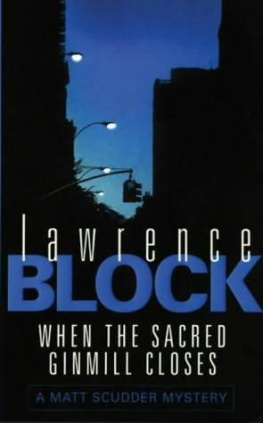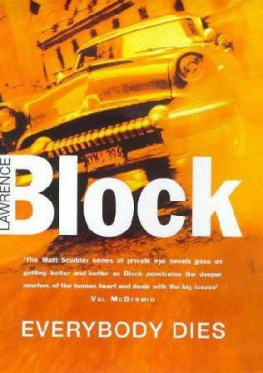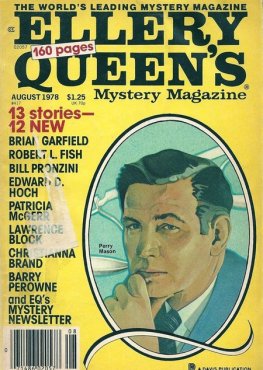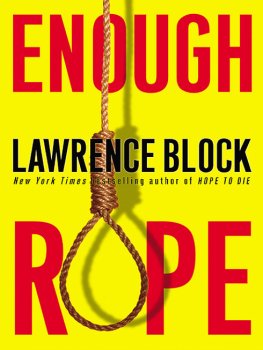Lawrence Block
The Ehrengraf Presumption
Ill fares the land, to hastening ills a prey,
Where wealth accumulates and men decay.
Oliver Goldsmith
Now let me get this straight, Alvin Gort said. You actually accept criminal cases on a contingency basis. Even homicide cases?
Especially homicide cases.
If your client is acquitted he pays your fee. If hes found guilty, then your efforts on his behalf cost him nothing whatsoever. Except expenses, I assume.
Thats very true, Martin Ehrengraf said. The little lawyer supplied a smile which blossomed briefly on his thin lips while leaving his eyes quite uninvolved. Shall I explain in detail?
By all means.
To take your last point first, I pay my own expenses and furnish no accounting of them to my client. My fees are thus all-inclusive. By the same token, should a client of mine be convicted he would owe me nothing. I would absorb such expenses as I might incur acting on his behalf.
Thats remarkable.
Its surely unusual, if not unique. Now the rest of what youve said is essentially true. Its not uncommon for attorneys to take on negligence cases on a contingency basis, participating handsomely in the settlement when they win, sharing their clients losses when they do not. The principle has always made eminent good sense to me. Why shouldnt a client give substantial value for value received? Why should he be simply charged for service, whether or not the service does him any good? When I pay out money, Mr. Gort, I like to get what I pay for. And I dont mind paying for what I get.
It certainly makes sense to me, Alvin Gort said. He dug a cigarette from a pack in his shirt pocket, scratched a match, drew smoke into his lungs. This was his first experience in a jail cell and hed been quite surprised to learn that he was allowed to have matches on his person, to wear his own clothes rather than prison garb, to keep money in his pocket and a watch on his wrist.
No doubt all this would change if and when he were convicted of murdering his wife. Then hed be in an actual prison and the rules would most likely be more severe. Here they had taken his belt as a precaution against suicide, and they would have taken the laces from his shoes had he not been wearing loafers at the time of his arrest. But it could have been worse.
And unless Ehrengraf pulled off a small miracle, it would be worse.
Sometimes my clients never see the inside of a courtroom, Ehrengraf was saying now. Im always happiest when I can save them not merely from prison but from going to trial in the first place. So you should understand that whether or not I collect my fee hinges on your fate, on the disposition of your case and not on how much work I put in or how much time it takes me to liberate you. In other words, from the moment you retain me I have an interest in your future, and the moment you are released and all charges dropped, my fee becomes due and payable in full.
And your fee will be?
One hundred thousand dollars, Ehrengraf said crisply.
Alvin Gort considered the sum, then nodded thoughtfully. It was not difficult to believe that the diminutive attorney commanded and received large fees. Alvin Gort recognized good clothing when he saw it, and the clothing Martin Ehrengraf wore was good indeed. The man was well turned out. His suit, a bronze sharkskin number with a nipped-in waist, was clearly not off the rack. His brown wing-tip shoes had been polished to a high gloss. His tie, a rich teak in hue with an unobtrusive below-the-knot design, bore the reasonably discreet trademark of a genuine countess. And his hair had received the attention of a good barber while his neatly trimmed mustache served as a focal point for a face otherwise devoid of any single dominating feature. The overall impression thus created was one of a man who could announce a six-figure fee and make you feel that such a sum was altogether fitting and proper.
Im reasonably well off, Gort said.
I know. Its a commendable quality in clients.
And Id certainly be glad to pay one hundred thousand dollars for my freedom. On the other hand, if you dont get me off then I dont owe you a dime. Is that right?
Quite right.
Gort considered again, nodded again. Then Ive got no reservations, he said. But
Yes?
Alvin Gorts eyes measured the lawyer. Gort was accustomed to making rapid decisions. He made one now.
You might have reservations, he said. Theres one problem.
Oh?
I did it, Gort said. I killed her.
I can see how you would think that, Martin Ehrengraf said. The weight of circumstantial evidence piled up against you. Long-suppressed unconscious resentment of your wife, perhaps even a hidden desire to see her dead. All manner of guilt feelings stored up since early childhood. Plus, of course, the natural idea that things do not happen without a good reason for their occurrence. You are in prison, charged with murder; therefore it stands to reason that you did something to deserve all this, that you did in fact murder your wife.
But I did, Gort said.
Nonsense. Palpable nonsense.
But I was there, Gort said. Im not making this up. For Gods sake, man, Im not a psychiatric basket case. Unless youre thinking about an insanity defense? I suppose I could go along with that, scream out hysterically in the middle of the night, strip naked and sit gibbering in the corner of my cell. I cant say Id enjoy it but go along with it if think thats the answer. But
Dont be ridiculous, Ehrengraf said, wrinkling his nose with distaste. I mean to get you acquitted, Mr. Gort. Not committed to an asylum.
I dont understand, Gort said. He frowned, looked around craftily. You think the place is bugged, he whispered. Thats it, eh?
You can use your normal tone of voice. No, they dont employ hidden microphones in this jail. Its not only illegal but against policy as well.
Then I dont understand. Look, Im the guy who fastened the dynamite under the hood of Ginnies Pontiac. I hooked up a cable to the starter. I set things up so that she would be blown into the next world. Now how do you propose to
Mr. Gort. Ehrengraf held up a hand like a stop sign. Please, Mr. Gort.
Alvin Gort subsided.
Mr. Gort, Ehrengraf continued, I defend the innocent and leave it to more clever men than myself to employ trickery in the cause of the guilty. And I find this very easy to do because all my clients are innocent. There is, you know, a legal principle involved.
A legal principle?
The presumption of innocence.
The presumption of? Oh, you mean a man is presumed innocent until proven guilty.
A tenet of Anglo-Saxon jurisprudence, Ehrengraf said. The French presume guilt until innocence is proven. And the totalitarian countries, of course, presume guilt and do not allow innocence to be proved, taking it for granted that their police would not dream of wasting their time arresting the innocent in the first place. But I refer, Mr. Gort, to something more far-reaching than the legal presumption of innocence. Ehrengraf drew himself up to his full height, such as it was, and his back went ramrod straight. I refer, he said, to the Ehrengraf Presumption.
The Ehrengraf Presumption?
Any client of Martin H. Ehrengraf, said Martin Ehrengraf, is presumed by Ehrengraf to be innocent, which presumption is invariably confirmed in due course, the preconceptions of the client himself notwithstanding. The little lawyer smiled with his lips. Now, he said, shall we get down to business?
Half an hour later Alvin Gort was still sitting on the edge of his cot. Martin Ehrengraf, however, was pacing briskly in the manner of a caged lion. With the thumb and forefinger of his right hand he smoothed the ends of his neat mustache. His left hand was at his side, its thumb hooked into his trouser pocket. He continued to pace while Gort smoked a cigarette almost to the filter. Then, as Gort ground the butt under his heel, Ehrengraf turned on his own heel and fixed his eyes on his client.



















